My thoughts on breaking in
Some first steps to finding your path as a writer
I try to keep my focus on this site on the craft of writing—mostly because practical questions about how to get jobs, book contracts, agents, and big bucks tend to bore me. But I am asked all the time for help from writers ready to take the leap, so I thought I’d organize my thoughts. Consider this my first salvo.
When someone asks me how to launch a career as a writer, I always feel flummoxed. I think of what Mark Twain said about his training (“I have never let my schooling interfere with my education”) and about what Picasso said about understanding art (“Why not try to understand the songs of a bird?”). And I think of a stone found many years ago on a beach in Tuscany, when I was walking with the Italian painter who acted as my mentor, imploring him to tell me how to “make it” as an artist. Myriad tiny blue lines scored its cool, jade surface. Any one of those lines, he hinted, might work.
Now, 25 years later, is there any advice I can offer besides a couple of quotes and a metaphor?
I think so, although every writer must find his or her right path. For starters, though, read a few good books. Go to your nearest public library or independent bookstore and peruse the selection in Writing Reference.  How to Get Happily Published is a classic, though last revised in 1998. More recently, Arielle Eckstut and David Henry Sterry have written
How to Get Happily Published is a classic, though last revised in 1998. More recently, Arielle Eckstut and David Henry Sterry have written  The Essential Guide to Getting Your Book Published: How to Write It, Sell It, and Market It . . . Successfully. Writers Digest publishes books providing nuts and bolts information. These won’t give you a prescription for professional success, but they will acquaint you with the world you long to enter.
The Essential Guide to Getting Your Book Published: How to Write It, Sell It, and Market It . . . Successfully. Writers Digest publishes books providing nuts and bolts information. These won’t give you a prescription for professional success, but they will acquaint you with the world you long to enter.
Then there are memoirs by writers (Reading, Writing, and Leaving Home, by Lynn Freed or Remembering Mr. Shawn’s New Yorker, by Ved Mehta) and editors (The Forest for the Trees, by Betsy Lerner). They, too, trace very individual roads taken by their authors, but they will give you a real sense of the writer’s life. A conversation  on Salon between veteran critic Laura Miller and veteran editor Bob Gottlieb blends the insightful and the inspirational.
on Salon between veteran critic Laura Miller and veteran editor Bob Gottlieb blends the insightful and the inspirational.
Join one of the organizations that exist to help writers find each other and share suggestions. I belong to the  American Society of Journalists and Authors. It’s national, and it has chapters in some metropolitan areas, but its online forums are helpful no matter where you live. Many smaller groups target specific niches, too. In my neighborhood alone (using the term loosely),
American Society of Journalists and Authors. It’s national, and it has chapters in some metropolitan areas, but its online forums are helpful no matter where you live. Many smaller groups target specific niches, too. In my neighborhood alone (using the term loosely),  Left Coast Writers,
Left Coast Writers,  Bay Area Travel Writers, and
Bay Area Travel Writers, and  The Writing Mamas all have strong track records.
The Writing Mamas all have strong track records.
Go to writing conferences. If you want practical sessions on how to succeed as a freelance nonfiction writer, go to ASJA’s big conference each spring. If you want soup-to-nuts on all genres, check out the  San Francisco Writers Conference. If it’s the craft of nonfiction storytelling you hunger for, try the annual narrative conferences at
San Francisco Writers Conference. If it’s the craft of nonfiction storytelling you hunger for, try the annual narrative conferences at  Boston University and the
Boston University and the  Mayborn School of Journalism in Texas. At
Mayborn School of Journalism in Texas. At  Book Passage in Corte Madera, California, you’ll find conferences for travel photographers, mystery writers, children’s book writers, and food writers. Caveat emptor: These conferences are serious, but some are just a way for the organizers to make money. But conferences can be inspirational and a lot of fun.
Book Passage in Corte Madera, California, you’ll find conferences for travel photographers, mystery writers, children’s book writers, and food writers. Caveat emptor: These conferences are serious, but some are just a way for the organizers to make money. But conferences can be inspirational and a lot of fun.
Find a writing community. This could be an intimate critique group that meets in your living room, or it could be a preexisting group that meets online (see  SheWrites). It might be an ad-hoc school where you meet people through classes and lectures, like
SheWrites). It might be an ad-hoc school where you meet people through classes and lectures, like  Grub Street in Boston or
Grub Street in Boston or  The Writer's Workshop in Seattle. I belong to the
The Writer's Workshop in Seattle. I belong to the  San Francisco Writers Grotto, a large group of professional journalists, poets, novelists, filmmakers, and other “narrative artists” who share a warren of offices and talk at lunch about whether to tweet, how to find the story in the mess of research notes, and what we’re reading. (You can become part of the community by subscribing to our monthly Notes.)
San Francisco Writers Grotto, a large group of professional journalists, poets, novelists, filmmakers, and other “narrative artists” who share a warren of offices and talk at lunch about whether to tweet, how to find the story in the mess of research notes, and what we’re reading. (You can become part of the community by subscribing to our monthly Notes.)
Say it’s something more personal you want, focused on you. Maybe a friendly voice on the phone, a bit of help in identifying the right agent, or advice on where to start publishing. I founded  The Prose Doctors with a small group of my favorite editors; we all do one-on-one coaching for a fee. A writing teacher might agree to play this role for you. Paying someone to be your guide and to hold you accountable can be more efficient than crying to your spouse—or to your therapist.
The Prose Doctors with a small group of my favorite editors; we all do one-on-one coaching for a fee. A writing teacher might agree to play this role for you. Paying someone to be your guide and to hold you accountable can be more efficient than crying to your spouse—or to your therapist.
Some websites and blogs offer sound advice and a broad range of opinions. The best ones aren’t just journals of lonely scribes or rants by writers rejected by one too many editors. Some provide solid information and tips. You’ve already found this Web site; others I find credible are Meghan Ward’s  Writerland and the blog by former agent
Writerland and the blog by former agent  Nathan Bransford.
Nathan Bransford.
Finally, ask a writer to lunch. Here’s a tip: Don’t just email the friend of a friend asking for general advice. Most writers worth talking to are busy writing. Most are also struggling financially. So take them to lunch—a nice lunch, a lunch they’d never treat themselves to. And before you even order an ice tea or San Pellegrino, make sure you’ve prepared yourself for a useful conversation by doing everything I’ve outlined above.
Wait! There is one more thing, the most important thing: Start writing and don’t stop. Try different genres, experiment with styles. Don’t ever wait for an editor to say Yes to a great idea—write what you know you must. Blog. Send essays to lowly newspapers. Write opinion pieces. Take classes. Seize every opportunity that comes your way. Just do it.
Then comes the part I really can’t help you with: Be persistent, develop a thick skin, and find a way to stay sensitive.
—Constance Hale
| |
Share This:




